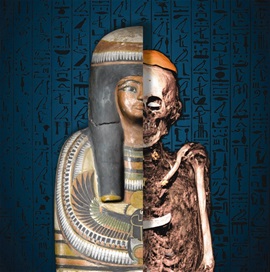 The Mummy of Nesperennub the Priest. Photo courtesy of the Queensland and British Museums. © The Trustees of the British Museum (2011). All rights reserved.
The Mummy of Nesperennub the Priest. Photo courtesy of the Queensland and British Museums. © The Trustees of the British Museum (2011). All rights reserved.
Watchwords
The Mummy Returns!
Before Nesperennub goes home to the British Museum, visit him and the 'Secrets of the Tomb' exhibition at the Queensland Museum - You'll
be wrapped!
There is an article coming, but in the meantime here are the basics...
Event: MUMMY: SECRETS OF THE TOMB
Date and time: Open daily from Thursday, 19 April 2012 to
Sunday, 21 October 2012. Check out the websites below for the date and time of the session you want. These are timed ticket events which are not flexible and sessions run approximately every half hour. You need to arrive 20 minutes before your session, which
begins with a 3D film; if you’re late they may not be able to let you in if the film is running.
Venue: Queensland Museum, Cnr Grey & Melbourne
Streets, South Brisbane (on South Bank next to the Art Gallery).
Ticket price: Attending this exhibition is rather like attending a movie session, but all
tickets need to be purchased before the event through Foxtix via their website at http://www.foxtix.com.au or by phone on 1300 111FOX (369). You can also go to the Queensland Museum website at http://www.mummy.qm.qld.gov.au
for a link to the booking and sessions pages.
Ticket prices are: Adult $21.45, Concession $19.25, Children (4–15 years) $12.65. There is also a Family ticket available
at $59.00 which admits 2 Adults/Concession plus 2 children (4–15 years). All ticket prices include booking fees and tickets are non-refundable. Children 15 and under must be accompanied by an adult. Wheelchair and easy access bookings can be made via
the phone on 1300 111 FOX (369) or via the Queensland Museum Box Office.
What’s happening: This exhibition is the result of a close collaboration between
the British Museum and the Queensland Museum. It was due to end in August 2012, but has proved to be so popular that it has been extended to Sunday, 21 October 2012.
There
is an astonishing 3D film which travels through the remains of a 3000-year-old priest of Ancient Egypt, composed without disturbing the mummy’s wrappings via advanced medical scanning technology. After this short film you pass through to the exhibition
space at the rear of the auditorium where there are more than 100 ancient objects on display, many of which appeared in the film along with a description of their purpose and usage.
It really is a fascinating exploration of ancient Egyptian civilisation from 2300 BC to the first century AD. As a child I was fascinated with ancient Egypt and would have been delighted to be taken to this exhibition. It was obvious that this was not
the case for every child present at the session that I attended. Nobody screamed or fainted while the film was playing, but the number of objects and the amount of reading associated with descriptions of the exhibits was too much for some children.
To view the entire exhibition, including the film takes from 60–90 minutes and some accompanying adults failed dismally in trying to explain to restless and complaining youngsters
that this was the experience of a lifetime. The Museum recommends that children attending the session be over the age of 8.
Given the admission price for children, and the
fact that the exhibition includes adult themes, some rather gruesome human remains, graphic medical scenes and some incidental nudity, I would suggest that if your offspring is an ‘Are we there yet?’ child, leave them at home regardless of how
beneficial you think a visit might be. That way you get to improve your own mind safe in the knowledge that you can look at the exhibition instead of watching what your children are doing amongst a plethora of priceless artefacts.